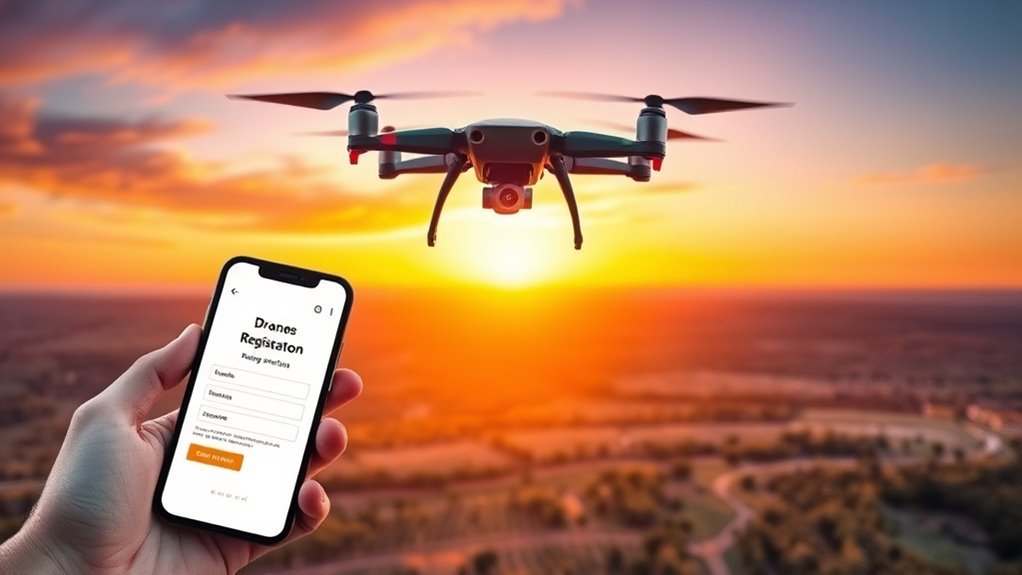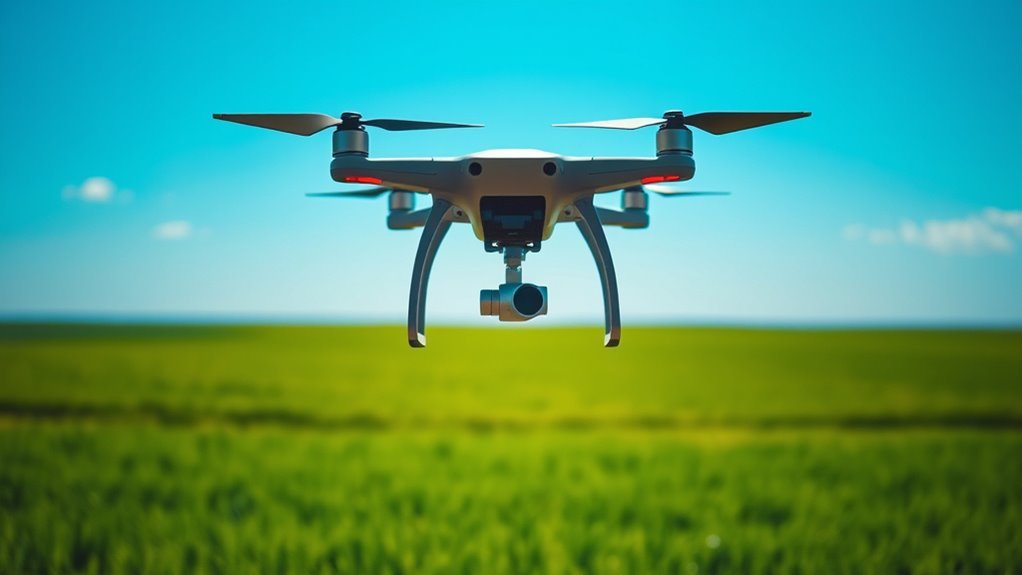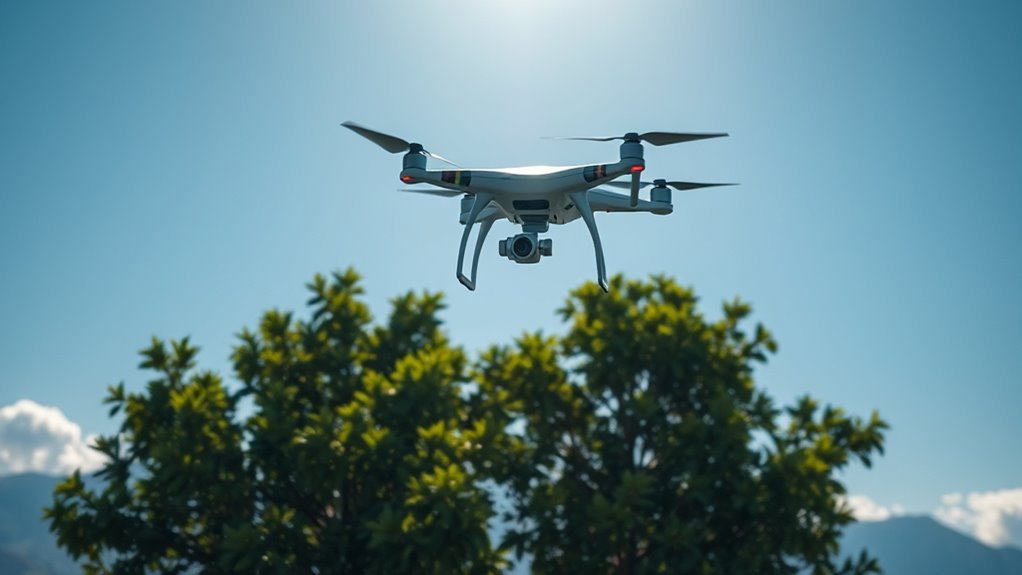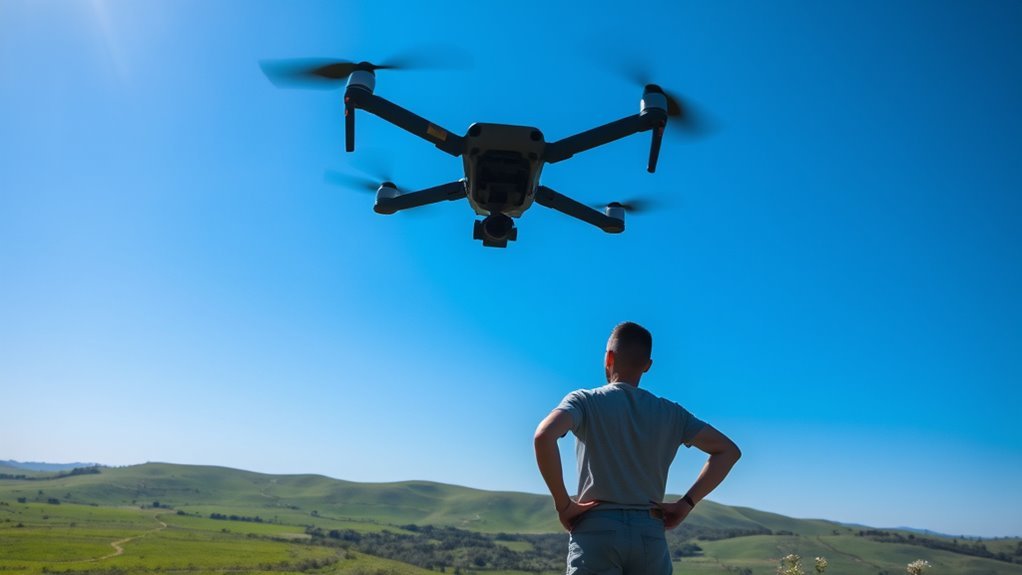If your drone weighs more than 0.55 pounds (250 grams) and you plan to fly it outdoors, you must register it to comply with legal and safety regulations. Registration applies to both recreational and commercial drones and is done online through the official aviation portal. Failing to register can lead to fines and restricted flying privileges. Understanding how to register, associated costs, and operational rules guarantees you stay within the law and avoid penalties—explore further to get all the details.
Understanding Drone Registration Requirements

When do you need to register your drone? You must register any drone weighing more than 0.55 pounds (250 grams) before flying outdoors. This requirement guarantees legal compliance and promotes drone safety by holding operators accountable. Registration is a straightforward process through the official aviation authority’s website, granting you freedom to fly responsibly. Whether you’re using your drone recreationally or commercially, registering it is crucial to avoid penalties and protect public airspace. Ignoring registration can lead to fines and restrict your ability to enjoy the skies freely. Understanding these registration requirements empowers you to operate your drone confidently and legally, balancing your desire for freedom with the responsibility of safe, compliant flight.
Types of Drones That Require Registration

Although not all drones require registration, you’ll need to register any drone that weighs more than 0.55 pounds (250 grams) and is intended for outdoor flight. The primary drone types subject to registration include recreational drones used for hobby flying and commercial drones utilized in business operations. Registration categories depend on your drone’s purpose: if you’re flying for fun, you’ll register under the recreational category; if your drone supports commercial activities like photography or inspections, you’ll register under the commercial category. Certain drones used by government or educational institutions might have exemptions, but most personal and business drones fall into these registration categories. Knowing your drone type and corresponding registration category guarantees you’re compliant while maintaining your freedom to fly responsibly.
How to Register Your Drone

To register your drone, you’ll need to complete a straightforward online process through the FAA’s DroneZone portal. Be prepared to provide details such as your name, address, email, and the drone’s make and model. Once registered, you’ll receive a unique identification number that must be clearly displayed on your drone.
Registration Process Steps
Registering your drone involves a few straightforward steps that guarantee compliance with federal regulations. First, visit the official registration website and create an account. Next, provide necessary details such as your name and contact information—this ascertains you reap the drone registration benefits like legal protection and easier recovery if lost. You’ll then pay a registration fee, typically valid for three years. After completing these steps, you’ll receive a unique registration number to display on your drone.
Avoid common registration mistakes like entering incorrect data or skipping the payment step, as these can invalidate your registration. By following the process precisely, you secure your freedom to fly without legal hassles, confirming your drone is ready for responsible and lawful use.
Required Information Details
What information do you need to provide when registering your drone? To complete the process, you’ll submit your full name, physical address, email, and a valid credit card for the registration fee. You’ll also specify the drone’s make, model, and serial number, ensuring accurate identification. This precise data supports drone safety by linking each aircraft to its operator, which helps prevent misuse and enhances accountability. Registration benefits include easier recovery if your drone is lost and compliance with legal requirements, protecting your freedom to fly. By furnishing this essential information, you contribute to a safer airspace and uphold your rights as a responsible drone pilot. Remember, accuracy is key—incorrect details can lead to penalties or registration denial.
Costs Involved in Drone Registration
When registering your drone, you’ll need to understand the specific fees involved, including initial registration and possible renewal costs. Be aware of additional charges that might apply depending on your drone’s use or category. It’s also important to know which payment methods are accepted to guarantee a smooth registration process.
Registration Fee Breakdown
Although the registration process itself is straightforward, understanding the associated fees is crucial before you proceed. When registering your drone, the registration fee is typically a one-time cost that varies depending on whether the drone is for recreational or commercial use. Here’s a clear fee comparison to help you plan:
- Recreational drones usually require a registration fee around $5.
- Commercial drones often have a higher fee, approximately $35.
- The registration covers up to three drones under a single account for recreational users, providing added value.
Knowing these costs guarantees you’re prepared and can maintain your freedom to fly within legal boundaries without surprises. By comparing fees upfront, you can make an informed decision that aligns with your drone usage and budget.
Renewal and Additional Costs
How often you need to renew your drone registration depends on the type of use and specific regulations in your area. Typically, recreational drone registrations require renewal every three years, while commercial registrations may have different timelines. It’s important to complete the renewal process promptly to maintain compliance and avoid penalties. Be aware that renewal often involves additional fees, which can vary based on your drone’s classification and the governing authority. Staying informed about these costs guarantees you’re not caught off guard, allowing you to keep flying freely and legally. By understanding the renewal process and potential additional fees, you can plan accordingly and avoid interruptions to your drone operations. Always check the latest local guidelines to stay up to date.
Payment Methods Accepted
Understanding the renewal fees is just one part of managing your drone registration costs. When it comes to payment methods accepted, the process is designed to be straightforward to keep you airborne without hassle. You’ll find that:
- Credit card payments are the primary and most convenient way to pay registration and renewal fees.
- Digital payment options, including online wallets and secure payment portals, streamline the transaction process.
- Some platforms may accept debit cards or other electronic payment methods but generally avoid cash or checks.
Using these accepted payment methods guarantees your registration is processed quickly, letting you enjoy the freedom of flying your drone while staying compliant. Make sure your payment details are up to date to avoid any interruptions in your drone privileges.
Rules for Recreational Drone Flyers
When flying a drone recreationally, you need to follow specific rules set by the Federal Aviation Administration (FAA) to guarantee safety and compliance. First, always keep your drone within visual line of sight. This guarantees you maintain control and avoid hazards. You must fly below 400 feet and avoid flying near airports or restricted airspace, adhering strictly to flight restrictions. Drone safety also demands you never fly over people or moving vehicles. Additionally, avoid flying at night unless your drone has proper lighting. Before you fly, check local laws and temporary flight restrictions, as these can change frequently. Following these rules lets you enjoy your drone while respecting others’ safety and airspace, giving you the freedom to explore responsibly and confidently.
Registration Rules for Commercial Drone Use
Because commercial drone operations involve specific regulatory standards, you’re required to register your drone with the FAA before conducting any business activities. Understanding commercial drone regulations is essential to maintain compliance and protect your freedom to operate. As a drone operator, your responsibilities extend beyond just registration. You must guarantee your drone is properly marked, follow operational rules, and maintain documentation. Key points to remember include:
- Register your drone under the FAA’s Part 107 rules, which apply to commercial use.
- Display your registration number on your drone in a visible location.
- Keep proof of registration accessible during all commercial flights.
Adhering to these registration rules for commercial drone use guarantees you meet legal obligations while enjoying the benefits of your drone business.
Consequences of Not Registering Your Drone
Failing to register your drone can lead to significant legal and financial penalties that could disrupt your operations. When you skip registration, you expose yourself to serious legal consequences, including fines that can reach hundreds or even thousands of dollars. Enforcement actions may include grounding your drone, confiscation, or legal prosecution, all of which restrict your freedom to fly. Authorities take unregistered drones seriously due to safety and accountability concerns. By registering, you not only comply with the law but also protect yourself from these costly enforcement measures. Staying within the legal framework guarantees that you can continue enjoying the freedom of drone flight without fear of interruption or penalty. Don’t risk your drone activities—register promptly to avoid these avoidable legal consequences and enforcement actions.

